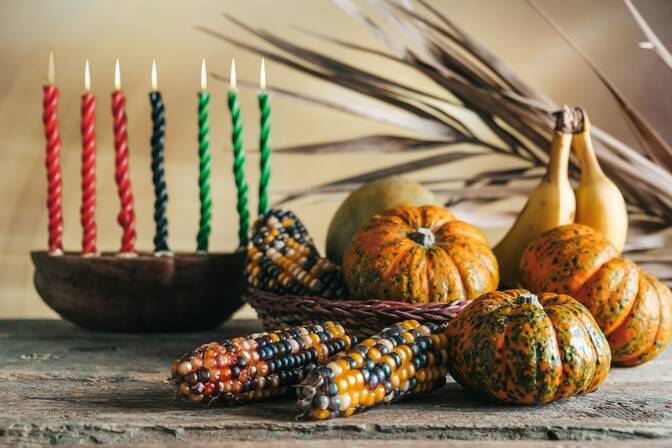Kwanzaa
26 - 31 de Dezembro, sexta-feira – quarta-feira

A História do Kwanzaa
O Kwanzaa foi criado em resposta às mudanças sociais e políticas na década de 1960, quando muitos negros americanos procuravam formas de celebrar a sua cultura e identidade. O feriado pretendia ser uma alternativa ou complemento ao Natal e a outras férias de inverno. A palavra "Kwanzaa" vem do suaíli e significa "primeira colheita".
Símbolos Kwanzaa
O Kwanzaa inclui vários símbolos importantes:
Kinara. Um castiçal com sete velas que representa os princípios de Nguzo Saba.
Maer (Mazao). Fertilidade, simbolizando a colheita e a riqueza.
Mapunga (Mshumaa). Velas, onde o vermelho simboliza o sangue e a luta, o verde - a esperança e o futuro, o preto - o povo e a sua identidade.
Karana (Kikombe cha Umoja). Taça da unidade, usada como libação para homenagear os antepassados.
Como se celebra o Kwanzaa
O Kwanzaa é um feriado que inclui muitos eventos tradicionais:
Cerimónias e reuniões. As famílias e as comunidades reúnem-se para celebrar, realizar cerimónias e partilhar histórias e experiências.
Decorações. As casas e os espaços públicos estão decorados com símbolos, tecidos e frutas africanas.
Alimentos e bebidas. As refeições comemorativas incluem, geralmente, comidas e bebidas tradicionais africanas.
Educação. A celebração inclui ainda elementos de educação sobre a cultura, história e património africano através de histórias, palestras e workshops.
O Kwanzaa não é apenas um feriado, mas também uma forma de homenagear a herança africana, fortalecer os laços comunitários e desenvolver a identidade cultural.
Kwanzaa em outros anos
- 2021 26 - 31 de Dezembro, domingo – sexta-feira
- 2022 26 - 31 de Dezembro, segunda-feira – sábado
- 2023 26 - 31 de Dezembro, terça-feira – domingo
- 2024 26 - 31 de Dezembro, quinta-feira – terça-feira
- 2026 26 - 31 de Dezembro, sábado – quinta-feira
